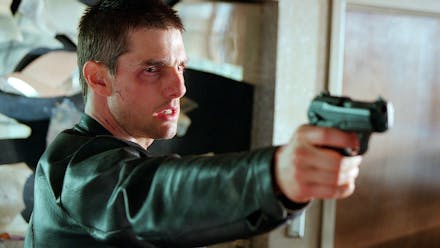The best scene in Minority Report involves a major character gruesomely trading one set of eyeballs for another. It is a deliciously dark joke upon which to rest the action, for Minority Report is a movie concerned with new ways of seeing. As such, it gives fresh impetus to a growing suspicion about the world's most successful director: Steven Spielberg himself has traded eyeballs.
From the murderous visions of the pre-cognitive trio, to the retina scans personalising your shopping experience in Orwellian fashion, Minority Report is saturated with metaphors for seeing. But look closer, and each new metaphor also functions as a commentary on the hazards of movie direction itself.
Watching Cruise's cop, Anderton, conduct the Pre-Cog output, sorting through complex future images with expert waves of gloved hands, is how you would like to believe Steven Spielberg directs - musically, masterfully. But Spielberg, long removed from brash youth, understands that ultimately all such confidence is misplaced.
A little later, Anderton's own skill betrays him when he zeroes in on his own face perpetrating a future murder. Images in Minority Report are unreliable, subject to interference and editing. The gritty cinematography, once again provided by Janusz Kaminski, has the flavour of faded family photos and recurring dreams. You cannot quite trust it, yet the locations seem horribly familiar.
Do not, then, be hoodwinked by the film's atavistic 'Everybody Runs' tagline; clearly the marketing people at Fox would like the Jurassic Park audience to believe this is a breathless action spectacle. It's not.
Minority Report is a hybrid film noir, pitched in moral twilight and steeped in shadow. There may be no blue in the bleached sky, but this is not a standard-issue dystopian future. Nor is it a satirical cartoon in the Paul Verhoeven tradition. Indeed, Spielberg, that most apolitical of directors, could be the first visionary to fashion a near-future that feels distinctly ours - organic, market-driven and teeming with as much danger as promise.
The film noir structure is adhered to until the bitter end, even if the luxurious running time lacks the adamantine precision of the films Spielberg would most like to imitate: The Maltese Falcon, The Big Sleep. The denouement, during which the detective unmasks the villain, is classic noir. The action, let it be noted, ran out an hour ago.








